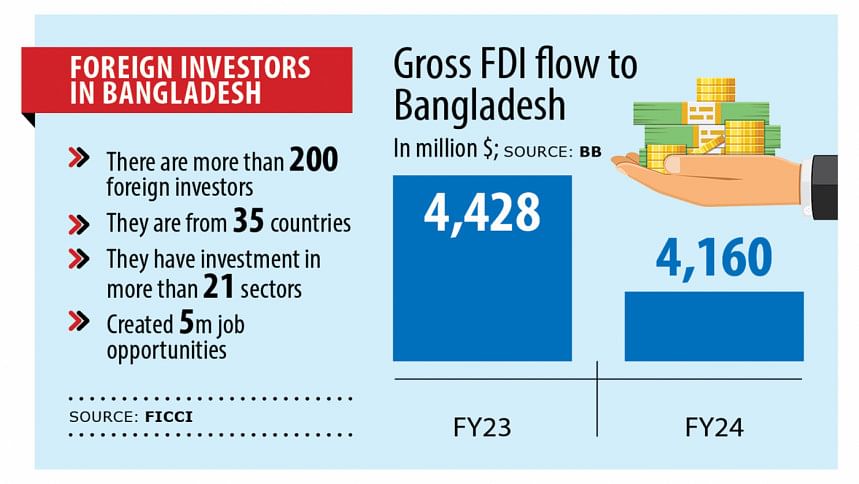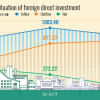Safety fear jolts foreign investors’ confidence

A lack of safety in foreign manufacturing and industrial units in Bangladesh, stemming from the debilitating law and order situation and labour unrest, has become a cause of major concern for foreign investors, denting their confidence.
The low presence of industrial police in some areas is another reason for faltering investor sentiment. Numerous representatives of foreign companies say there is no functional authority which they can turn to for protection in some industrial zones.
Currently, many investors are negotiating with leaders of the Collective Bargaining Agents (CBAs) to resolve the crisis and resume operations, with labour demands mostly centring pay rises.
Investors also said it was unusual that workers had placed charters of demand abruptly in the middle of the year and against the backdrop of a regime change, suspecting that perhaps a section of outsiders is taking advantage of the policing vacuum.
There have not only been disruptions to production workers but, in some cases, also tried to vandalise manufacturing units. For instance, workers attacked a shoe factory operated by a foreign company in Tongi area this week.
Moreover, foreign investors fear that if labour unrest continues, it may spill over onto their units as well.
Arfanul Hoque, retail director of Bata Shoe Company (Bangladesh), said they negotiated with workers to bring the situation under control and also took help from police.
Production at their unit was affected but normalcy is now being gradually restored as the management has already met the workers' demand for a pay hike, Hoque said, adding that around 600 regular workers and 800 outsourced workers had placed their demands over the past week.
However, since their factory is located in a major industrial hub, industrial police were available to help, he added.
A representative of a major European garment retailer that sources apparel worth several billion US dollars each year said they had to change their plans due to the spate of labour unrest.
The company's shipments are getting delayed, which is very unusual, and that is expected to hit its sales in the upcoming Christmas season, he said.
The crisis is also affecting payment gateway companies, with the business of such companies operating in Bangladesh falling by 40 percent in July and 35 percent in August, said Syed Mohammad Kamal, country manager at MasterCard Bangladesh.
Lack of safety and security is a big barrier towards running industrial units for both local and multinational companies.
"Ultimately, foreign direct investment will be affected if the proper steps are not taken immediately to restore normalcy in industrial zones," he added.
Rupali Chowdhury, managing director of Berger Paints Bangladesh, echoed the same.
"Lawlessness is not good for even a day. We do not know who is behind this situation. We also don't know who we can turn to for protection as the industrial police are not fully functional," said Chowdhury, also a former president of the Foreign Investors' Chamber of Commerce and Industry (FICCI).
"The situation needs to be improved urgently. We have zero time."
She said their workers also demonstrated like many others, but the management sat with the CBA leaders and resolved the issues through mutual understanding.
Mohsin Ahmed, chief executive officer of New Zealand Dairy, a foreign company located in Narayanganj's Rupganj, said: "We have not faced any disruptions to production. But we have already improved how engaged the management is with the workers so we do not face any problems."
New Zealand Dairy's unit, which employs around 1,000 people, is located close to the Gazi Tyre Factory, which was repeatedly attacked by vandals and set ablaze.
"Improving the mental strength of police is very important so they can help industrial units in times of crisis," Ahmed told The Daily Star over the phone.
Nazma Akter, president of Sammilito Garment Sramik Federation, said many who were contractually employed by foreign companies demanded permanent posts after the political changeover.
Amirul Haque Amin, vice-chairman of the Bangladesh Institute of Labour Studies, echoed Nazma's sentiments.
He said it is obvious that workers will raise their demands when the situation is favourable for them.
"However, most foreign companies have good CBAs. So, hopefully, they can handle the situation well," he added.
TIM Nurul Kabir, executive director of the FICCI, said only one foreign company, namely Bata Bangladesh, had sent a letter to the chamber regarding an attack on their factory.
Two or three factories owned by other members were also affected, but they have not lodged any complaint with the chamber yet.
He said FICCI has already held meetings with the authorities to raise concerns, adding that army personnel had been deployed in industrial areas where incidents of unrest have taken place as the industrial police are not fully active now.
The army has also provided a hotline where anyone can place emergency calls, he said.

 For all latest news, follow The Daily Star's Google News channel.
For all latest news, follow The Daily Star's Google News channel. 








Comments